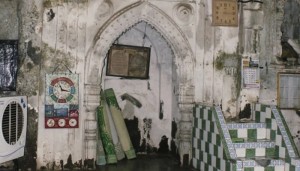In the latest attack on the Muslim community by the Modi-led Bharatiya Janata Party (BJP), prayers have been banned in an 800-year-old mosque in an Indian state, The Wire reported Saturday.
The district collector in BJP-ruled Maharashtra’s Jalgaon passed an interim restraining order while hearing a complaint filed by a right-wing organisation, according to the news outlet.
The government official, under section 144 of the Code of Criminal Procedure, immediately banned prayers, summoned police in the area, and asked the tahsildar to take charge of the mosque, claiming that it was “disputed”.
The order and the collector’s powers have been challenged in the Bombay high court.
But Aslam, a member of the Jumma Masjid Trust, is fearful that the latest move against the Muslim community “marks the beginning of the communalisation of a centuries-old mosque in the state”.
Aslam, for as long as he remembers, has seen Muslims praying five times a day inside Jumma Masjid in Jalgaon’s Erandol.
The 800-year-old masjid is registered under the Waqf Board and is an essential place of worship for the locals.
“Pandavwada Sangharsh Samiti”, an unregistered organisation, had filed the application against the mosque, pushing the centuries-old mosque into controversy.
The complainant, Prasad Madhusudan Dandawate, had filed the complaint before the collector, Aman Mittal, in May.
According to his Facebook profile, the complainant is a member of the extremist Rashtriya Swayamsevak Sangh (RSS), the Vishwa Hindu Parishad (VHP), and Bajrang Dal.
In his complaint, Dandawate claimed that the mosque was built over a Hindu place of worship and is illegal and should be taken over by the state authorities.
The complainant also claims that the Jumma Masjid Trust has “illegally” encroached over the space.
The mosque’s trust members told The Wire that they did not know about the complaint until they received the district’s collector’s notice in June.
“By then, the collector had already been conducting hearings. In a restricted time, we were asked to defend our case. And on July 11, the collector simply passed a restraining order,” Aslam, one of the ad-hoc members of the trust committee, said.
The Archaeological Survey of India (ASI) has also backed the trust’s claims that it is an ancient structure.
The Waqf Board, under which the mosque has been registered, has also challenged the district collector’s powers.
“The collector can interfere to the extent of handling the law-and-order aspects here; everything else is the Waqf board’s responsibility. The property has been registered with the board since 2009 and there is no ambiguity in that aspect,” Moin Tahsildar, the CEO of the board, told The Wire.









Comments